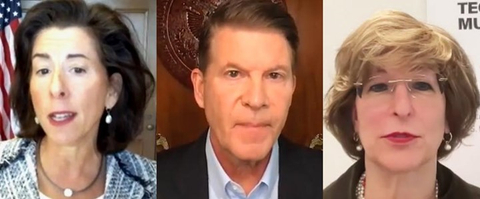Purdue Center for Tech Diplomacy Chairman Keith Krach and Director Bonnie Glick Counsel Commerce Secretary Gina Raimondo on Securing Semiconductor Supply Chain
Purdue Center for Tech Diplomacy Chairman Keith Krach and Director Bonnie Glick Counsel Commerce Secretary Gina Raimondo on Securing Semiconductor Supply Chain
Krach Singled Out as One of the “Heroes” Playing a Lead Role in Defending Against the CCP’s Techno-Authoritarian Threat
Center for Tech Diplomacy at Purdue Board Chairman and 2022 Nobel Peace Prize nominee Keith Krach (center), and Director Bonnie Glick (right) were invited by U.S. Secretary of Commerce Gina Raimondo (left) to offer advice on the national imperative of securing the semiconductor supply chain. (Photo: Business Wire)
WEST LAFAYETTE, Ind. & WASHINGTON--(BUSINESS WIRE)--On March 21, 2022, Center for Tech Diplomacy at Purdue Board Chairman and 2022 Nobel Peace Prize nominee Keith Krach, and Director Bonnie Glick were invited by U.S. Secretary of Commerce Gina Raimondo to offer advice on the national imperative of securing the semiconductor supply chain. Their counsel was part of a bipartisan discussion with Senator Todd Young (R-IN), Rep. Doris Matsui (D-CA), former National Security Advisor H.R. McMaster, former Deputy National Security Advisor Matt Pottinger, and former Google CEO Eric Schmidt.
During his service as Under Secretary of State, Krach and his team were instrumental in the $12 billion onshoring of TSMC (Taiwan Semiconductor Manufacturing Company), along with its ecosystem, the largest such deal in American history and a quantum leap forward in securing the semiconductor supply chain. The deal was heralded as a “game-changer,” sparking chip producers like Intel and Samsung to build their own “trusted” fabs, which resulted in $300 billion of committed investment and American jobs.
The TSMC onshoring led to close collaboration between Krach’s team and Senators Cornyn (R-TX) and Warner (D-VA), paving the way to the design of the CHIPS for America Act, one component of the Bipartisan Innovation Act. For another part of the Bipartisan Innovation Act, Krach’s team presented to Senate Majority Leader Schumer (D-NY) and Senator Young (R-IN) the initial concept of the research funding bill in critical technologies known as the Endless Frontier Act. The proposal included a plan to grow $150 billion in funding into a $500 billion investment, with matching investments from the private sector and a coalition of technological allies Krach dubbed the “Techno-Democracies-10 (TD-10).”
Chairman Krach compared the Bipartisan Innovation Act to the Apollo program, stating that “it serves as a powerful catalyst for additional private-sector investment and sends a clear message to our citizens, allies, and the Chinese government itself that America is united in its commitment to preserve our precious freedom from authoritarianism.”
Bonnie Glick, the inaugural Director of the Center for Tech Diplomacy at Purdue and former COO of the USAID, noted: “I cannot underscore enough the criticality of the Bipartisan Innovation Act and other bipartisan efforts that have, as their underlying goal, keeping America as the go-to country for investment from abroad as well as from our incredible private sector. We are sitting atop an opportunity in the United States to solidify the lead in manufacturing of critical technologies and to bulwark alliances with like-minded nations to keep the spigots turned on for the manufacture of critical technologies like semiconductors. Inaction will further enable efforts by the government in China and its state-owned enterprises to gain market share and erode competition.”
The Center’s work is based on the “Trust Principle” doctrine deployed by Chairman Krach during his tenure in the U.S. Department of State to rally like-minded governments and companies to secure the high tech sector and advance peace and freedom as part of the Global Economic Security Strategy (GESS). Rep. Mike McCaul, chairman of the Congressional China Task Force, credited Krach with developing this “new model of Tech-Statecraft rooted in trust by integrating high-tech strategy with diplomatic tools and building the Clean Network, which defeated the CCP’s masterplan to control 5G.” Harvard Business School said Krach’s achievements in defending freedom from technological authoritarianism “changed the future of global technology."
Last month, Krach and Glick added their names to a bipartisan letter from 16 national security experts across multiple U.S. administrations addressed to House Speaker Pelosi and Senate Majority Leader Schumer, as well as Republican House and Senate leaders McCarthy and McConnell. The letter urges Congress to quickly pass this legislation to ensure the U.S. remains globally competitive and “stays on the cutting-edge of microelectronics.” Other notable signatories of the letter included Stephen Hadley, Eric Schmidt, and former Defense Secretary Leon Panetta—member of the Center for Tech Diplomacy Advisory Board—as well as former Deputy National Security Advisor Matt Pottinger and former Under Secretary of Defense Michele Flournoy.
About the Center for Tech Diplomacy at Purdue:
The Center for Tech Diplomacy at Purdue is the world’s preeminent institution focused on tech-statecraft, a new model of diplomacy that aims to advance freedom by bridging the gap between innovators and decision makers in foreign policy and national security. It brings technological and engineering expertise to U.S. foreign policy, focusing on rallying our allies, leveraging the innovation of the private sector, and amplifying democratic values based on trust.
For more information, go to techdiplomacy.org, or follow the Center for Tech Diplomacy at Purdue on Twitter, LinkedIn, and YouTube.
Contacts
Kennedy Lee, techdiplomacy@prf.org

